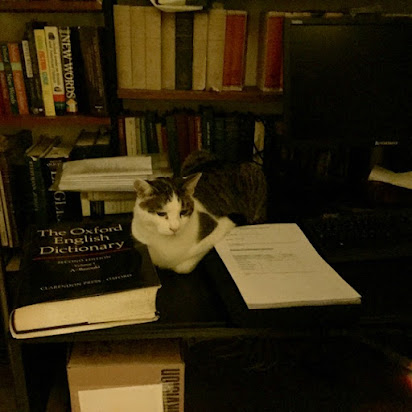Who'd Be a 'Writer'? -- by Clare Weiner (AKA Mari Howard)
Are you a plotter or a pantser? This question is not infrequently found in online writers groups.
 |
| Spike, the dictionary cat... |
It’s one I had never thought about until I joined the rather diverse community of a couple of online writing groups. One was pretty useful, the other maybe less so... There I soon learned how many of us humans decide at a really young age that, contrary to what used to be the memes about racing drivers, explorers, even sports stars or nurses, what captivates the imagination of the young child, sometimes even under the age of learning to read, is to be a writer!
This particular career had never occurred to me: surely writers were elevated people such as Beatrix Potter, Arthur Ransome, the Brontë sisters, the slightly risqué Lynne Reid Banks, the more conventional Anne Tyler, and of course whoever it was who wrote Winnie the Pooh?
Of course having a mind stuffed full of this and that diverse content and ideas, and having attended university rather than art school (my chosen career but not approved) eventually my narrative mind began to write seriously. I joined a couple of online groups and discovered some tropes and memes of writing. Many of these may explain why my (non-literary) friends consider my writing ‘a nice little hobby’: there appear to be several necessary hobby-like items such as the addiction to buying prettily covered notebooks to be added to the others in the drawer (after display on Facebook), special pens, a ‘t.b.r. pile’ (books by friends, bought but not read!). Also, an addiction to lovingly collecting interesting-sounding words. And subscribing to writing magazines which provide prompts and competitions, and of course advertise retreats, both humble and UK-based or exotic including a luxury hotel on a Greek island. The spin-offs create a vast industry in themselves!
Then, after much diligent ‘character creation’, plot-planning, and the consumption of much coffee, comes the angst of ‘submission’: cap-in-hand writers, in common with all creatives, must find the equivalent of a patron.
Here the fun starts again: and it seems the editing process has now expanded, adding, to copy-editing, line editing, developmental editing, and sensitivity editing. Indeed before the book arrives in a bookshop it has become a collaborative effort between the writer who had the idea, and the publishing house whose nose is sniffing and whose ears are to the ground, discovering what is fashionable in reading this season, or rather will be fashionable next season!
Really if small children knew the number of people, the amount of money, the time and effort which goes into turning a writer’s work into a shiny new marketable product, would so many then look back and say, happily, ‘I always wanted to be a writer’—?
It is simpler and more accurate to describe myself as a storyteller. That’s really what I am. Trained in sociology, bothered about the way I see society breaking up into individualism rather than neighbourhood communities, increasing knife crime, cancel culture, and general intolerance — this in spite of many useful scientific developments, which, used properly, make our lives easier, and misused can get horribly out of hand (while making their manufacturers rather wealthy), I find myself writing stories which hold a mirror up to our society. The bit I live in, and not in an unfriendly way. But neither to use the crimes, violence and exploitation to excite and entertain. More to simply say: here we are, is it where we want to be, can we negotiate, compromise, and learn to live together on this crowded planet? Does it really matter so much to get our own way, regardless of others, and is that the only meaning to living our best life?
Comments
In the end that's all that matters: a good story, told well. Appealing characters, realistic dialogue and moral messages aren't add-ons, they are fundamental to story creation. If not woven organically into the plot, no story, however action-packed, will grab the reader; conversely if the plot doesn't stand up, no one will give two hoots about the wonderfully-drawn characters and limpid prose. Oh, except in literary fiction of course. (Cynical, that's me, but you'd be surprised by the number of highly acclaimed, beautifully written prize-winning novels there are, with plot holes the size of moon craters. Clearly this doesn't bother the editors or they'd say something, surely?)
Keep up the story telling, I say.
So sorry to read of the down day, Mari. I did mean to respond to your blog but got distracted. I hope the book manuscript is successful.